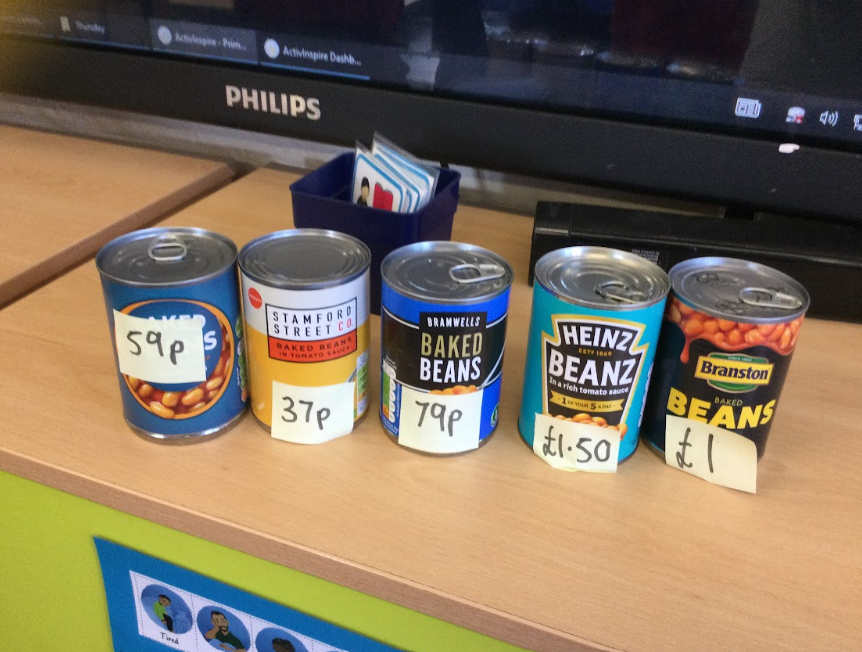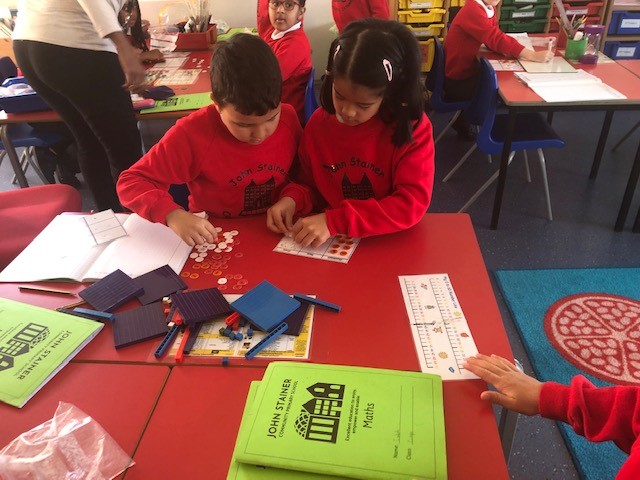Maths

At John Stainer, we endeavour to support and challenge children in their learning to ensure that they become confident, creative mathematicians.
Our Mathematics teaching and learning is underpinned by the principles of ‘mastery’. Pupils learn that Mathematics is not just about numbers and calculations. In fact, they can use their skills to solve problems, spot patterns, create designs, manage their finances and reason confidently.
We believe that all children can achieve; it is possible for everyone to ‘grow their brain’ and become fluent mathematicians. All children are taught through whole class interactive teaching, in which everyone has equal opportunity to answer questions and share their thoughts, in order for them to master the content laid out in the 2014 National Curriculum. Within these whole class lessons, a variety of different resources and styles of questions are used to deepen their understanding of the concepts being explored. Within the KS1 and KS2 classrooms, you would see:
- Children using concrete manipulatives and pictorial representations alongside the more abstract aspect of numbers and symbols. This enables children to visualise and understand the mathematical concepts and structures. Everyone working through the curriculum content at a similar steady pace to ensure new ideas have been embedded.
-
Support or scaffolds for those children who need it and challenge for those that have fully grasped the content of the lesson, through teacher questioning, small group work and varied activities.
-
Key mathematical language and stem sentences being used by all to explain and reason.
-
Work often taking place in mixed ability groups with children supporting one another with their learning. This helps to support children with their reasoning and explaining skills.
-
Feedback given within the lesson in order for children to correct, consolidate or extend their learning.
-
Knowledge being applied through reasoning and problem solving activities.

Alongside the main content of the lesson, 10-15 minutes of the day are used to develop children’s fluency of facts such as multiplication tables, number bonds, time and equivalent units of measure. Some children are offered additional time during the week to secure these facts through regular small group interventions. In addition, teachers organise pre-teaching or quick response sessions to ensure that no-one is left behind with the curriculum.
Click/tap the icon below to view our curriculum
Home learning: Mathletics
In addition to our work in school, all children have a login to Mathletics, the most used mathematics website with 3 million users and 7000 schools worldwide.
It has over 850 fantastic activities for ages 5 to 18 years, as well as the extremely enjoyable Mathletics Live where pupils can compete against children from around the world!
Parents can sign up to receive a weekly report on their child’s progress and see the results first-hand, providing a perfect link between home and school. Children are motivated by receiving points and being awarded certificates; teachers set levels for individual pupils so that they will always be challenged and therefore will access Mathletics at the appropriate level.
Pupils and parents enjoy the instant feedback after each activity, showing where strengths and weaknesses may be. Please encourage your child to regularly log in and make the most of this amazing resource!
Intent
At John Stainer, we want all our pupils to be confident, fluent and competent mathematicians. Through a mastery approach, we aim to:
- Ensure children have a fluent knowledge of arithmetic.
- Be able to work with numbers.
- Apply their skills to problem solving.
- Use known mathematical facts.
- Embedding their understanding of mathematical concepts through reasoning by using a rich and varied mathematical vocabulary. This ensures that pupils do not see mathematics as an isolated subject but part of their everyday lives.
At the core of what we believe, is ensuring children are confident and positive about mathematics through fostering success. We want every child to be confident mathematicians, as such we have two Maths Leaders who drive the early maths program in our school. Building connected mathematical knowledge and retention are fundamental to our ethos at John Stainer Primary. In all, we aim to develop mathematicians that are resilient and courageous in their mathematical endeavours.
Implementation
At John Stainer Primary, we use the White Rose schemes of learning to support our planning of lessons. The mastery approach embedded into our lessons, fosters the concrete, pictorial, abstract approach developed by Bruner. Lessons are structured around this approach with a high emphasis on concrete manipulatives to promote understanding.
Part of our daily maths lessons are as follows:
- Retrieval practice – this incorporates interleaving to ensure spaced practice of fluency.
- Focused diagnostic questioning to inform the teacher of misconceptions in order to adapt and respond accordingly (responsive teaching).
- Carefully planned, precise worked examples to develop conceptual and procedural knowledge; this incorporates principles of variation to ensure children see mathematics framed in different ways.
- Manipulatives (accessed readily) and scaffolds to support learners’ understanding, used appropriately by the teacher and withdrawn when appropriate.
- When appropriate knowledge has been secured, exposure to rich mathematical investigations and inquiry opportunities in order to broaden understanding of relationships.
- Teachers skilfully question, follow-up and respond to learners, in order to gather levels of understanding to adapt teaching.
- Following the lesson, if children are unsure or show a lack of understanding that needs further input, they attend same-day intervention.
Maths in EYFS:
In an EYFS classroom, maths is also taught through interactive daily sessions, including whole class and group work, which lead on to open classroom opportunities for the children to engage with the learning in different ways. You would see:
- Learning throughout all the areas, for example counting out money in the role play area, comparing volume in the water area, counting pots and pans in the mud kitchen and building shapes in the construction zone.
- Children developing their reasoning and problem solving skills through investigation and play.
- Practitioners modelling, observing and asking questions in order to move the learning forward.
White Rose schemes of learning are used to inform teachers’ planning so that children are prepared with the appropriate mathematical knowledge required to access the Year 1 curriculum.
- We relate the mathematical aspects of the children's work to the Development Matters statements and the Early Learning Goals (ELG).
- The profile for Mathematics areas of learning are Number (ELG 11) and shape, space and measures (ELG 12).
- We provide children with opportunities to practise and improve their skills in counting numbers, calculating simple addition and subtraction problems, and to describe shapes, spaces, and measures.
- We provide children with opportunities to engage in maths activities both inside and outside of the classroom. Easily accessible, quality maths resources are provided so that children can self-select and engage freely as well as engaging in planned activities. Whenever possible, children’s interests are used to support delivering the mathematics curriculum.
- We continually observe and assess children against these areas using their age-related objectives, and plan the next steps in their mathematical development.
The following documents show the strategies we use when teaching Maths at John Stainer.
multiplication and division calculation policy july 2022.pdf
addition and subtraction calculation policy july 2022.pdf
Impact
Our maths curriculum is of a high quality and ensures there is clear progression. In order to ensure we measure impact, we gather a variety of data and feedback to check whether learning has occurred. The information gathered through these methods directly impacts the future planning of teaching and learning opportunities, ensuring that we are responsive to the needs of our learners.
- Ongoing formative assessments and daily fluency practice allow teachers to check for children’s retention of previously taught concepts
- Regular questioning in lessons informs future learning and builds on prior knowledge
- Progress is evident in children's daily written work and through discussion about their learning.
- Summative assessments are carried out at the end of each term to check what children know and remember over longer periods.
Beyond the curriculum

Our whole curriculum and termly class enterprise teach children to recognise that attitudes are as important as knowledge and skills in shaping financial behaviour.
LifeSavers is a unique programme for primary schools offering a whole school approach that provides:
-
Resources and training for teachers to embed financial education into the school curriculum
-
Support for school savings clubs to give children a practical experience of handling money
-
A whole community approach that involves parents, credit unions and others in helping children learn about money
Credit union
Below are some of our Student Leaders who work as Cashiers on Mondays, to process children's savings.
With attitudes towards money formed as young as seven, we are working closely with the Credit Union to educate and develop children and their families to develop better financial awareness in order to manage their money more effectively. Our school credit union is run by a group of Year 6 children (and supervised by members of staff).
For more information, ask to speak with our Maths Leaders (Mrs Power or Miss Suttle).
Other useful websites:
Below are some websites that you might like to use for extra support and interactive activities:

